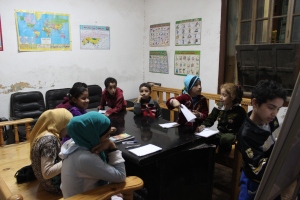CAIRO – Mostafa Wafa, 24, recalls the time he was walking through Saft el-Laban – the tough, mostly informal suburb of Cairo where he lives – when a group of children approached. They greeted him warmly, but they were breathless and excited, and held knives and sticks. “Uncle Mostafa – we beat them up!” they boasted, referring to kids on another street. The incident stuck in Wafa’s mind.
Wafa and a group of friends decided to offer free lessons to deprived children in the area to address what he sees as the root cause of many of the problems in Egyptian society – an abysmal level of education. “We decided to call it Mish Madrasa [‘Not a school’] because our aim was to be what every public [state] school in Egypt is not.”
Egyptian schools are notorious for their overcrowding, decrepit infrastructure, abuse, rigid and stifling curricula, and didactic teaching methods. Public school teachers receive a meagre salary – rarely amounting to more than $281 a month – creating an incentive to teach a limited amount in order to force parents into paying for private lessons after school. Wafa describes this as a “shadow system”.
“The middle-class guys like me can survive – they can go to the shadow system and pay. What about the children whose parents can’t afford it?” says Wafa. Many children in the area are approaching adulthood but are almost completely illiterate: “This produces guys who are disappointed, ignorant, angry, and violent.”
Wafa and some friends started the non-profit project in February 2014. Around 25 kids turned up on the first day. Mish Madrasa was initially teaching Arabic, English, history and maths. They wanted to teach the children to be critical thinkers, to be more cultured, and to consider alternative perspectives from the national curriculum. Over time Wafa realised that the goals were overambitious: “We were saying things that in an ideal world were great, but in the practical world are not that effective.”
When Mish Madrasa conducted research, canvassing 65 families in the neighbourhood, they found a consensus among the parents’ priorities: they wanted their children to be literate, to speak a second language, and to know how to use a computer. In the survey no one said they were satisfied with the standard of public education, and the kids complained of being abused, disrespected and unencouraged at school. Wafa overhauled the lessons: they now focus on English, literacy and computers – and became more mindful of the children’s emotional needs.
The project faces a daunting set of difficulties. At the moment it is self-funded and they cannot afford crucial supplies such as computers, or a printer or projector. Their teaching space is basic and cramped. Many volunteers have dropped out in frustration or depression, and Wafa faces both hostility and indifference in the neighbourhood.
Wafa says he sees the project as an alternative, not just to the public school system and the private lessons, but also as an alternative to many NGOs, who he believes have had a limited impact in improving education – and as an alternative to the ideologically loaded services offered by Islamist and Salafi organisations.
An Islamist man who runs a local private tutoring centre came to see Wafa and asked: “Are you trying to pull the rug from under me?”
[Read the rest of the article published by Middle East Eye here]
